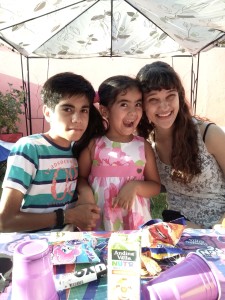
host sibs, alonso & laura
Meeting folks in Santiago transforms me into an improbably untalented actor rehearsing lines. The script is easy and yet each cue brings with it a wave of existential panic: What IS my name? What AM I doing here? Today, I realize that I’ve been incorrectly answering the question how long have you been here for the past three weeks.
No, I haven’t been here dos semanas anymore: I’m well into week five. My failure to update my answer reflects more than a deer-in-the-headlights Spanish response at this point. Even after spending a month on the ground, I feel that I’m still waiting for things to begin.
This feeling of delayed immersion is in part due to the IFSA program layout. After orientation we jumped headlong into a course selection process, made difficult because we can take classes at any of three different universities. Even registering for my chosen classes was a multiple-day multiple-campus multiple-misunderstood-directions process. I still haven’t attempted to print out my readings.
Santiago has been smoggy and hot. I’ve tentatively begun to get a feel for the layout of the city, and getting lost in this urban jungle has proved more fruitful than stressful. One wall of my room sprouts an a array of post-its highlighting new Spanish vocab. When I’m ambitious, I add to it. When I’m not, I slather butter on white bread and eat it in my room in a state of monolingual self-pity.
Don’t let me paint myself the victim, here: so far I’ve self-jeopardized my immersion in a variety of delightful ways, using English to stay in touch with folks back home and develop new relationships here.
Last week we had two days off during semana santa, the week leading up to Easter. Positioned oddly as it was at the very beginning of classes, I nonetheless took advantage of the sole break of the semester to splurge on an extended trip down south to Chilean Patagonia. A group of us spent four nights backpacking through Torres del Paine National Park, which may be as close to Antarctica as I’ll ever venture.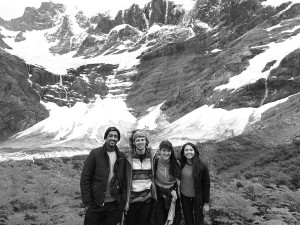
Situated between the “Roaring Forties” and the “Furious Fifties” latitudes, Patagonia’s windy and erratic weather makes Oregonian fluctuations look almost tame. Many visitors to the park stay in pricey refugios along the most popular trail, 40+ mile route known as the W. We slept fitfully in our rented tent, gleefully spurned chances to shower, and only grieved a little when mice emptied our cheap boxed wine the first night (poor drunken fools!)
If we weren’t college students on a budget, would we still choose the defiantly rugged path? Walking churns out thoughts, and we kept coming back to questions of subjectivity. Do we prefer experiences simply because we are taught to appreciate them within our family and class circles? Looking through the windows of refugios, we awkwardly made eye contact with hikers eating $30 meals, cloth napkins in laps. They looked back through the glass at us heathens, perhaps also contemplating objective contentment.
Surely there’s objectivity in the park’s beauty, we decided—although even here, we wondered how those living in the midst of such beauty would understand it differently. My friend Ben taught us how to spit like champions after brushing our teeth at night, broadcasting a mist of toothpaste to minimize our trace. As I vaporized my toothpaste I thought about the impact conservationism has had on indigenous peoples across the world. In the effort to protect beautiful places, many have been marginalized because their existence muddies the concept of “pure” nature.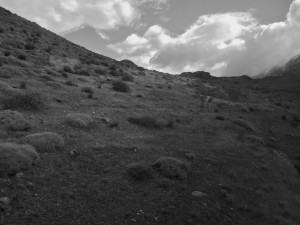
Torres del Paine certainly feels pure, especially after a month in Smog-iago (Santi-smogo?) The park is hoarding more than its fair share of the world’s supply of the color blue, and the sky is like my favorite kind of music: somehow both angsty and jubilant. The terrain is astonishingly varied, as if the american southwest, Alaska, and the mediterranean all decided to room together for a wild semester.
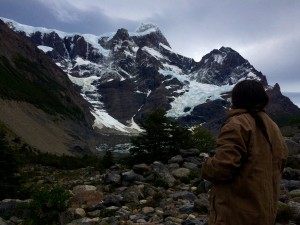

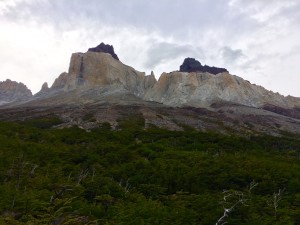
Speaking to locals in Santiago about the trip I’m met with a kind of nostalgia for a place they’ve never been. Chileans feel ownership and pride towards Patagonia while recognizing that it’s a destination largely frequented by non-Chilean tourists. I have to make it down there, they all say, and I agree and feel not a little sheepish about my privileged pilgrimaging. On the W we met a lot of extranjeros, both nice and annoying foreigners trading Lonely Planet tips and trail mix. Strangers greet each other on the trail with awkward holas, saying hi in a language that likely neither party speaks. It becomes a game: did we just pass a foreigner or a R e a l C h i l e a n?- and I find the exchanges both offputting and comforting, tiny homages to the country spoken unabashed gringo accentuation.
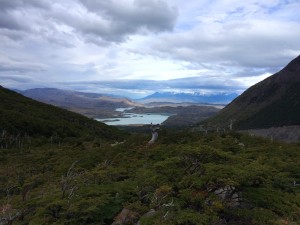
Great writing, Willa, and I saw some of your photos of the trip on Facebook. So, what classes are you taking? How much longer do you get to stay there? My advice — do as much traveling as you can; traveling to new places is great education!
Willa, i’m loving your writing!!! Thank you for the scope, the fun, the truth in your words. Their is a beautiful ease, like a master calligrapher with a sword or brush, creating word scape in the breadth of a breath. I’m all in…. Thank you
Thanks for the kind words! Bob, I’m here until mid-July. I’m taking two classes at the University of Chile: Sociology of the Environment and Collective Memory after Political Violence. They’re both fascinating and very difficult in Spanish. I’m also doing a research project while here, on the effects of polarization and economic stratification on urban reforestation and activism. Oh, and I’ve got a Spanish grammar class in which we’re reading a book for “kids aged 8-88.”
I saw that Tevan will be interning with NOAA this summer—y’all must be excited for him!
Yeah, ocean acidification policy for Tevan this summer in D.C. Sounds cool! (or hot and humid actually). Your courses sound really interesting, as well as the project. How’s campus life? Must be a great adventure. Study abroad is cool! I got to study abroad, sort of, when I was an undergraduate. I spent a summer in Israel, and did some projects at the Weizmann Institute of Science. It was awesome!!
Hey Willa!
After pouncing on your last post I wanted to prove that even the most enthusiastic of dads can show some restraint. So I waited for nearly two weeks to respond, thinking about your beautiful insightful words. What comes to me is a question: is the experience of swimming in another culture a reflection of a larger immersion?
Every day people go about our routines, exchanging words with folks who generally reaffirm whatever views we have of the world. It’s easy to become complacent if we stick close to what is familiar, never wonder whether these exchanges are just tiny approximations of what’s really happening around us.
Earlier today I sold someone a memoir by Sting, lead singer for The Police. Been in the shop for a year. Not a group I listened to a lot in my youth, but I’ve always liked them.
While musing on your post I’ve been remembering one of their hit songs from 1981. I recall walking on the sand at Myrtle Beach, late one night with a high school friend whose parents immigrated to the U.S. from Paraguay.
“Do you believe we really are spirits in the material world?” he asked in earnest, a welcome departure from the usual party banter.
“Si,” I said. Over time, with practice, we discover our common language.
Love!
Dad
I both liked and listened to a lot of The Police. Just listened to a few songs by hitting that link, Watt. That brings back memories… Sting has made quite a career for himself after The Police broke up, in many different genres. He’s a true talent. I really liked the reggae-like beat of The Police. Some important lyrics; some not so. But the music was great.
We’re probably spirits in a spiritual world, by the way.
Excellent rabbinic clarification!